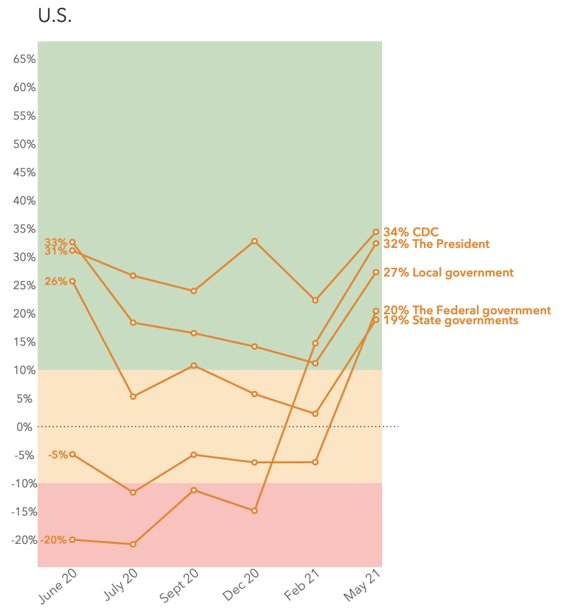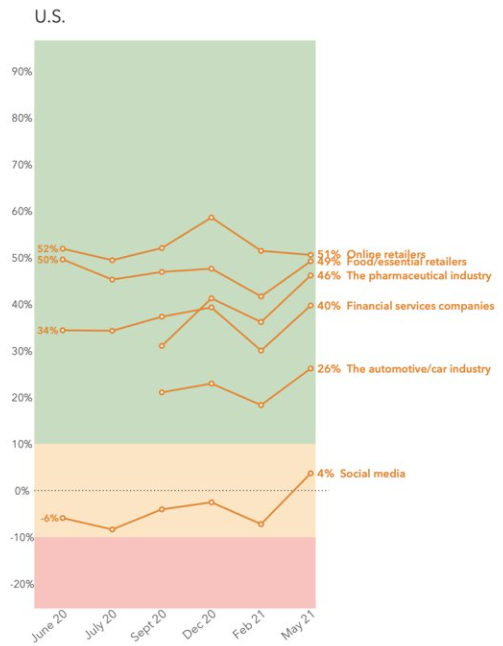NEW YORK, May 12, 2021 – Americans’ willingness to take COVID-19 vaccines has increased dramatically since February, as have their expectations for economic recovery and confidence in President Biden, the CDC, and all levels of government, according to the newest edition of a pandemic opinion poll surveying a nationally representative sample of 1,000 American adults, conducted by leading strategic communications firm Kekst CNC.
Key findings:
- 76% of Americans express a willingness to take the COVID-19 vaccine, an increase of 24 points from September and 12 points since February;
- The percentage of respondents indicating that the vaccine rollout was too slow dropped to 14% from 41% in February;
- American respondents indicated enthusiasm about returning to the office, with nearly 70% of workers reporting they would like to spend more time in the office than at home in a hybrid work from home model;
- Confidence in the CDC, President Biden, and every level of government dramatically increased from February, with the CDC, the institution of the presidency, and the federal government reaching their highest approval ratings in the past year.
In regards to the findings, James Johnson, Senior Advisor for Research at Kekst CNC said,
“Since February, we have seen a massive shift in U.S. respondents’ likelihood to take a COVID-19 vaccine. This 12 point jump – the largest in all markets surveyed – was coupled with 56% of respondents expressing they believe the vaccine rollout is happening at the right speed, a 24 point increase since our last survey in February. Notably, a majority of both Democrats and Republicans think that the vaccine rollout is going well.”
A slight majority of Americans, 51%, indicated that they believe the U.S. is handling the vaccine rollout better than any other country, with 38% and 36% of respondents, respectively, indicating that they believe Israel and the UK have handled vaccine rollout well.
Johnson continued, “As confidence in the vaccine rollout has increased, Americans have expressed a readiness to return to office, with 67% of respondents indicating they would like to be in the office more than half the time within the next year. At the same time, respondents’ concern about the economic impact of the pandemic, both on a local and national level, has dropped to its lowest level yet.”
“As the U.S. sees massive shifts in public health and economic outlooks, our survey also indicated that approval ratings of all levels of government, from the President down to local officials and including the CDC, increased dramatically,” concluded Johnson.
The survey found that public opinion of American institutions has increased substantially since February, reversing declines previously seen in approval of the CDC and federal, state, and local governments, and continuing gains seen in the previous period by the President.
Graph of respondents stating various institutions were responding to the pandemic well

Among industries, approval of online retailers remained relatively unchanged from February, while all other industries saw increased approval. The social media industry achieved a net positive approval rating for the first time since the tracking survey began. The pharmaceutical industry also reached its all-time high since the tracking survey began.
Graph of winners and losers during the pandemic by industry

Comparing the U.S. to the other countries surveyed:
- Over half of Americans (51%) believed the national economic situation would be stronger in three months’ time, coming second after the U.K. (53%) and ahead of Sweden (30%), Germany (24%), France (19%), and Japan (10%).
- Only 20% of US respondents indicated they believed the national economic situation would be worse in three months, the lowest rate among the countries surveyed. Japan (66%) led negative three-month outlook, followed by France (51%), Germany (41%), Sweden (28%), and the U.K. (26%).
- American respondents were the second-most concerned about the health of people in the country as a whole (52%), a decrease from 55% in February. Fifty three percent of the respondents in the U.K. were also worried about the health of people in their country as a whole, a decline from 58% in February. Half of respondents in Germany (50%), and less than half in France (46%), Sweden (39%), and Japan (41%) expressed a high level of concern for the health of people in their country as a whole. Japan and Germany were the only countries where concern for the health of people as a whole increased from February.
- U.S. respondents remained the most likely to say they feared for their own health (46%), followed by those in France (44%), Germany (41%), the U.K. (39%), Japan (33%) and Sweden (30%). The U.S. was the only country that did not see a decline in concern about personal health from February.
Methodology and Full Results
- Nationally representative sample of 1,000 adults in The United States, 1,000 adults in Great Britain, 1,000 adults in France, 1,000 adults in Germany, 1,000 adults in Sweden, and 1,000 adults in Japan
- Fieldwork took place from April 22nd – 30th, 2021
- Quotas and weights on gender, age, and region in each country
- Margins of error of +/- 3.3% for all markets
- Full results of the global survey available at: https://www.kekstcnc.com/insights/covid-19-opinion-tracker-edition-8
Media Contacts:
For the U.S.
Jeffrey Taufield
+1 212-521-4815
[email protected]
For the U.K., France, Germany, and Sweden
James Johnson
+447826714286
[email protected]
For Japan
Jochen Legewie
+819027547776
[email protected]

